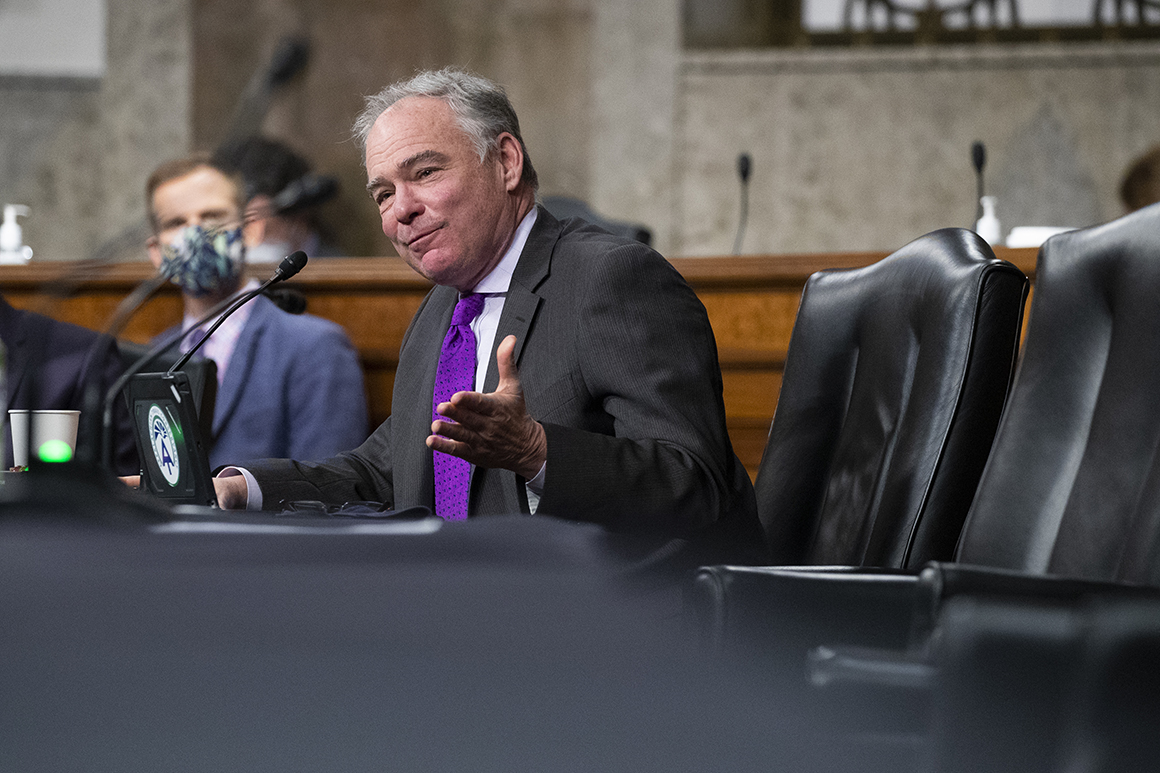Even before Donald Trump’s impeachment trial begins, some Senate Democrats are getting ready to speed to the end.
After only five Republican senators joined Democrats in a vote Tuesday essentially declaring that Trump’s trial was constitutional, some in the new majority are signaling they’d like to quickly focus their attention elsewhere. If it wasn’t obvious before, they say, it’s now clear the GOP isn’t going to convict Trump.
“To do a trial knowing you’ll get 55 votes at the max seems to me to be not the right prioritization of our time,” Sen. Tim Kaine (D-Va.) told reporters Wednesday. “Obviously we do a trial, maybe we can do it fast, but my top priority is Covid relief and getting the Biden Cabinet approved.”
Under Senate rules, the chamber is obligated to hold a trial now that an article of impeachment has been delivered. But lawmakers can decide how long the trial itself will last or whether to hear from any witnesses. Several Democrats emphasized in interviews Wednesday that they view Trump’s second impeachment trial as far different from his first, given that senators themselves witnessed the insurrection.
“This is a pretty straightforward trial,” said Sen. Chris Murphy (D-Conn.). “I never thought it needed to be as long as the Ukraine trial which was a very complicated charge with a lot of witnesses and important testimony. I would hope we could get this done in a week.”
Sen. Debbie Stabenow (D-Mich.), a member of Democratic leadership, agreed: “It is really a judgment call about whether or not people think that his inciting an insurrection and essentially an attack on our democracy warrants conviction.”
The trial comes as the new Democratic majority is eager to confirm President Joe Biden’s nominees and advance his agenda, including another coronavirus relief package. But rushing through the proceedings could also undercut the only chance to hold Trump accountable for inciting the deadly riot at the Capitol and prevent him from running for office again.
Some Democrats are in no mood to discuss any timeline for the trial. Asked whether Tuesday’s procedural vote forced by Sen. Rand Paul (R-Ky.) informed his thinking on how much time Democrats should spend on the trial, Sen. Chris Coons (D-Del.) responded that senators need to take a step back.
“Our job isn’t just to answer the minutiae of today’s Twitter-fueled news cycle but to think about our republic and its health and its viability,” said Coons, a close Biden ally. “We just had one of the most terrifying incidents in American history that put in question the viability of our democracy. How much time do you think we should spend on that?”
Coons added: “I’m struck at how few of my colleagues seem concerned about the quality of their answers.”
The parameters for the forthcoming impeachment trial have yet to be set. Senate Majority Leader Chuck Schumer (D-N.Y.) and Senate Minority Leader Mitch McConnell (R-Ky.) reached an agreement last week that the trial would begin the week of February 8 and established a schedule for House impeachment managers and Trump’s defense to file their trial briefs. But Schumer and McConnell still need to work out the organizing resolution to govern the trial itself. Earlier this week, Schumer told MSNBC’s Rachel Maddow that the trial will be “fair” but also done “relatively quickly.”
Democrats are privately predicting the trial could start Tuesday February 9 and wrap up by the weekend. But the length of the trial could also depend on whether the House impeachment managers decide to bring in additional witnesses.
Sen. Bernie Sanders, the new Budget Committee chairman who would help steer any relief package under reconciliation procedures, also signaled his desire to move quickly on the trial. “I would hope that we deal with that as quickly as possible,” he said, adding that he wants to see "the needs of working families" addressed.
While Senate Democrats are broadly expected to vote to convict Trump, they may only win over the five mostly moderate or retiring GOP senators who already voted with them: Sens. Susan Collins, Lisa Murkowski, Mitt Romney, Pat Toomey and Ben Sasse. That’s far short of the 17 needed to convict Trump on a two-thirds majority.
Even after departing the White House largely disgraced in the eyes of official Washington, Trump has maintained his grip on the GOP. Many Senate Republicans are coalescing around the argument that it’s unconstitutional to convict a former president, though that claim is disputed by other legal scholars, including members of the conservative Federalist Society. Republicans have been eager to focus on procedural arguments against impeachment and not on Trump’s behavior.
Some Republicans suggested that their vote Tuesday was not necessarily an indication of their final vote on whether to convict the former president. McConnell is among the Senate Republicans who say they remain undecided. The Kentucky Republican told reporters Wednesday that he’ll listen to both sides of the argument.
“I hope enough Republicans join us to impeach this president,” said Senate Majority Whip Dick Durbin (D-Ill.). “If they don’t, perhaps we’ll consider some alternatives.”
Among the alternatives under discussion is a possible censure resolution, though it’s not yet clear whether it could gain momentum.
Collins told reporters Wednesday that she and Kaine are working on a proposal that she said would be “in lieu of a trial.”
“The outcome of the trial is already obvious,” Collins said. “I believe yesterday’s vote shows clearly that there is no possibility of conviction… the question is, is there another way to express condemnation of the president’s activities with regard to the riot and the pressure that he put on state officials?”
Burgess Everett contributed to this report.




















